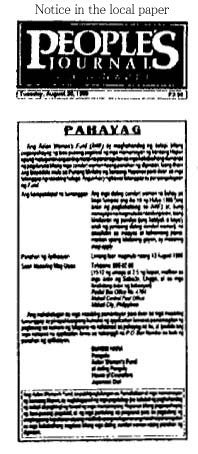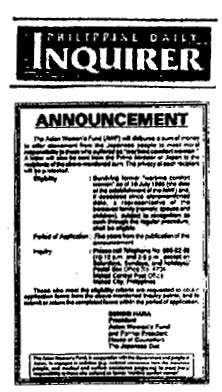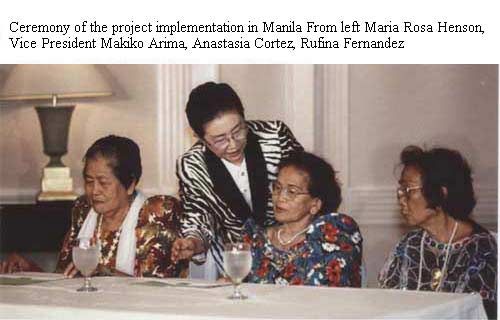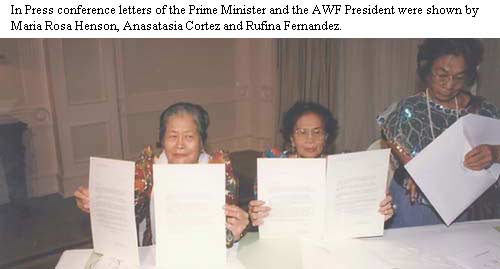 |
Projects by country or region - Philippines |
|
 |
 |
|
|
| Project implementation |
|
|
At first, LILA-Pilipina was opposed to the Asian Women's Fund when it was established in 1995. But some lolas, including Ms. Henson, indicated a desire to benefit from the Fund's atonement projects. LILA-Pilipina came to the decision that accepting the Fund's atonement money and continuing with the lawsuit were compatible with one another. A committee was established within LILA-Pilipina to support lolas who had decided to accept benefits from the Asian Women's Fund.

Completing the government application for benefits was a complicated process, because of the documentation that had to accompany the application: the applicant had to attach a description of conditions at the time when she was forced to become a comfort woman, a photograph, an affidavit from the local government or non-governmental organization(NGO) identifying her as a former "wartime comfort woman" based on the knowledge of the war time period, her birth certificate, and her marriage certificate.
The consultative entity on the Philippine side with ultimate responsibility for the atonement projects was a task force of the Philippine Government called the Special Committee to Address the Comfort Women Issue. This Special Committee was composed of government officials from the Department of Foreign Affairs, the Department of Social Welfare and Development, the Department of Justice, the Department of Health, and the National Commission on the Role of Filipino Women. The task force gave authority for the authentication of former comfort women to  the Department of Justice, and gave authority for the implementation of the medical and welfare support projects to the Department of Social Welfare and Development. Application forms and documentation were submitted to the Department of Justice, and their examination then began. the Department of Justice, and gave authority for the implementation of the medical and welfare support projects to the Department of Social Welfare and Development. Application forms and documentation were submitted to the Department of Justice, and their examination then began.
Attorneys of the Department of Justice interviewed applicants and checked applications. Finally they drew conclusions, whether applicants could be recognized "comfort women".
Those recognized as former comfort women were provided with a letter of apology from the Japanese Prime Minister. The letter was sent from the Embassy of Japan in the Philippines via the Philippine foreign ministry. The Asian Women's Fund presented atonement money to the women. In addition, medical and welfare support projects, funded by the Japanese Government and valued at an equivalent of 1.2 million yen per recipient, were implemented through the Philippine Government's Department of Social Welfare and Development.
On 13 August 1996, the Asian Women's Fund announced information on its projects in Philippine newspapers. |
|
|
The following day, a ceremony at a Manila hotel was held to mark the provision of atonement project benefits to three of the four people approved as beneficiaries so far: Maria Rosa Henson, Anastasia Cortez and Rufina Fernandez. On behalf of the Prime Minister, the Ambassador of Japan presented the letter to them, and Ms. Makiko Arima, Vice-President of the Asian Women's Fund at the time, presented each of them with information on the contents of atonement projects.
|
|
 |
|
|
|

|
Ms. Henson spoke in front of more than 100 reporters gathered there, expressing her deep happiness that she was seeing the results of a dream she had thought would never come true. Ms. Cortez spoke next, saying she had suffered for more than 50 years, but was glad to have obtained justice and assistance. Ms. Fernandez expressed her thanks for the Japanese Prime Minister's apology, and said it was the apology that had persuaded her to be present that day. During the press conference, when asked whether recent events had made it possible for her to forgive, Ms. Henson replied that she had been asked that question many times since coming forward in September 1992, and that she had indeed forgiven ---; that if she had not forgiven, God would not forgive her.
|
|
Many other former comfort women and Japanese people in support groups criticized me, saying that I would never regain my human dignity without compensation from Japan itself. There's no contradiction in accepting benefits from the AWF and continuing with the lawsuit, and there's nothing stopping me from doing both." - Maria Rosa Henson |
|
|
|
  |
|
|

